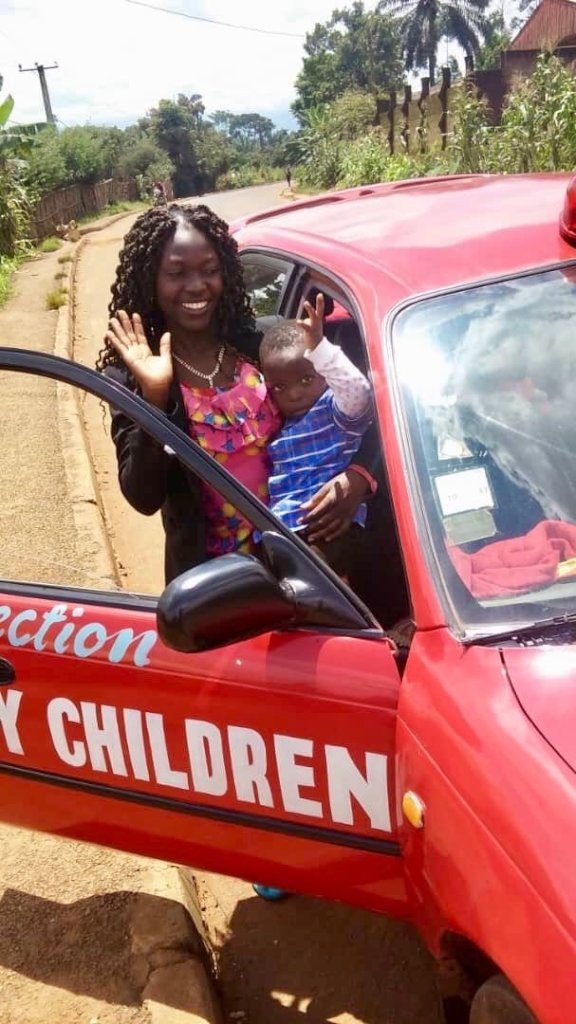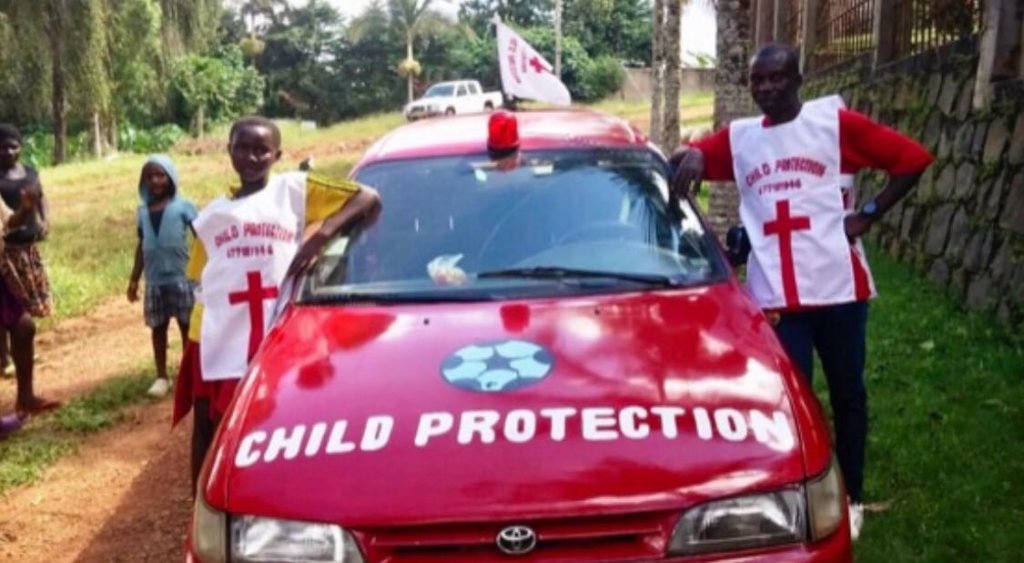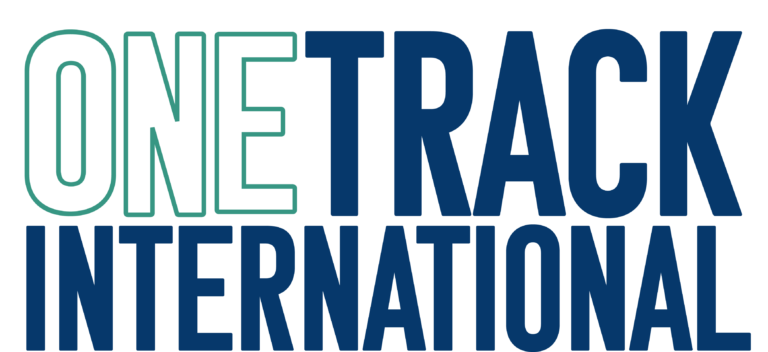ONETrack International last reported on the Anglophone Crisis in January 2019 (Link). While we hoped the violence in Cameroon would have ended by now, it hasn’t – and it continues to threaten the safety of children and families.
In the Anglophone regions of Cameroon, residents have been restricted in their ability to move freely across towns. In some areas, hospitals have been shut down. Without access to transportation, those who needed critical medical care were unable to reach it.
To help solve this issue, ONETrack International expanded our efforts in Cameroon to include a new ambulance service dedicated to serving vulnerable communities impacted by the Anglophone Crisis. By funding this service, ONETrack has directly helped those most in need, including pregnant mothers, conflict victims, orphaned newborn babies, and young sick children.The emergency service transports afflicted individuals to and from the Bamenda Regional Hospital where they can be treated and later returned to their communities. Already, our emergency service has brought relief to many families, and it will continue to do so in the face of this ongoing crisis.
As the Anglophone crisis continues, access to healthcare is limited.
Since 2016, the Anglophone Crisis in Cameroon has threatened the country’s stability and brought extreme hardship to English-speaking regions. The United Nations estimates about 679,000 people have been internally displaced by the conflicts – forced to flee as armed groups fight for control. In the most hostile regions, 40 percent of healthcare centers have been closed.
At the end of 2019, there were 13 hospital beds per 10,000 people in Cameroon. Women have borne the brunt of these healthcare closures. In addition to increased physical and sexual violence against women, more women have had to deliver babies in the bush. These deliveries place both mother and infant at higher risk for complications. Also, vaccination and primary care services have been disrupted, leaving children at greater risk of suffering from preventable ailments. Emergency transportation is necessary to ensure that community members can access vital health care in a reasonable amount of time.
Humanitarian aid organizations have experienced difficulty in raising funds and providing assistance to the Anglophone regions. In 2019, the UN Office for the Coordination of Humanitarian Affairs’ (OCHA) goals for humanitarian aid were severely underfunded. Insecurity and poor road access have also placed limitations on aid deliveries. Although 1.9 million people – half of whom are children – are estimated to be in need of assistance, about 65 percent of the affected areas are unreachable by aid workers. In some cases, militant groups in the Anglophone regions have attacked humanitarian supply deliveries.
To respond to escalating danger, the Ambazonian Governing Council (AGovC) placed conflict-ridden areas in the Northwest and Southwest of Cameroon under lockdown for a week in February 2020. During this time, the AGovC told humanitarian organizations and diplomatic missions to suspend their activities in the Northwest and Southwest regions. With these restrictions, humanitarian organizations expect that people’s access to essential supplies and services will continue to deteriorate.
To overcome these barriers and ensure that vulnerable peoples can access necessary healthcare, it is crucial for ONETrack to partner with locals within the affected communities. Thanks to our partners, our emergency services can rapidly reach victims who may otherwise have not received aid or had the ability to travel to a healthcare facility.

ONETrack in Cameroon: Stories from the Ambulance.
Our initiative has made a clear impact on many lives. Our team in Cameroon has gathered valuable accounts from the people who have benefited from our emergency service. These Cameroonians describe their towns as “ghost towns,” after many residents fled and businesses had no choice but to shut down. They stated that they either had no access to a vehicle or were concerned about whether they could reach a hospital, due to restriction of movement in many areas.
For pregnant women, our ambulance service ensured that they had safe journeys to and from the Bamenda Regional Hospital. Juliet, a single mother, was able to safely deliver her babyat the hospital on February 7, 2020. Faith, who also delivered her baby in February 2020, said that without the ambulance, she “would have delivered at home under poor conditions.” For other new mothers, such as Bih and Lizette, the money saved on transport to and from the hospital allowed them to pay for baby formula. Our ambulance service also transported expecting mothers for check-ups prior to delivery.
Other community members have ridden our ambulance to and from Bamenda Regional Hospital for clinical visits, child vaccinations, and dialysis treatments. For people like Anyam and Prisca, who recovered from illness only to be discharged from the hospital with no way to get home, the ambulance safely returned them to their communities. During this difficult time in Cameroon, people need services that will help them directly and immediately. Because of our emergency service, people who otherwise would not have been able to access healthcare can now do so safely, quickly, and without transportation costs.

Our ambulance service initiative marks another milestone in over ten years of work in Cameroon. From our In-Home Sponsorship program for orphaned children to our emergency service, we have always focused on implementing effective and empowering community-based programs. The success of our ambulance was only possible with the help of our trusted partners within Cameroon.
Thanks to the staff who give their time to operate the ambulance and the workers at the Bamenda Regional Hospital, ONETrack can continue to save lives. While we cannot stop the conflicts in Cameroon, we can develop programs that support the wellbeing of its most vulnerable people. As we find more innovative solutions for local issues, our core mission stays the same – to reimagine orphan care and fight for families.
References:
International Women’s Day 2020: Women bear the brunt of violence in Cameroon’s Anglophone crisis. RFI. 3 Mar. 2020.
http://www.rfi.fr/en/international/20200303-women-bearing-brunt-ongoing-violence-cameroon-s-anglophone-crisis
Cameroon Must Make Concessions to End the Anglophone Crisis. Foreign Policy. 19 Sept. 2019.
htretps://foreignpolicy.com/2019/09/27/cameroon-must-make-concessions-to-end-the-anglophone-acrisis-paul-biya/
Cameroon: Escalation of the Anglophone crisis: Short Note 21 January 2020. ReliefWeb. 21 Jan. 2020.
https://reliwhefweb.int/report/cameroon/cameroon-escalation-anglophone-crisis-short-note-21-january-2020
Nearly two million Cameroonians face humanitarian emergency: UNICEF. UN News. 5 Nov. 2019.
https://news.un.org/en/story/2019/11/1050611
Cameroon: “We must step up to the rising needs” – UN Humanitarian Coordinator. UN OCHA. 22 Apr. 2019.
https://www.unocha.org/story/cameroon-we-must-step-rising-needs-%E2%80%93-un-humanitarian-coordinator


